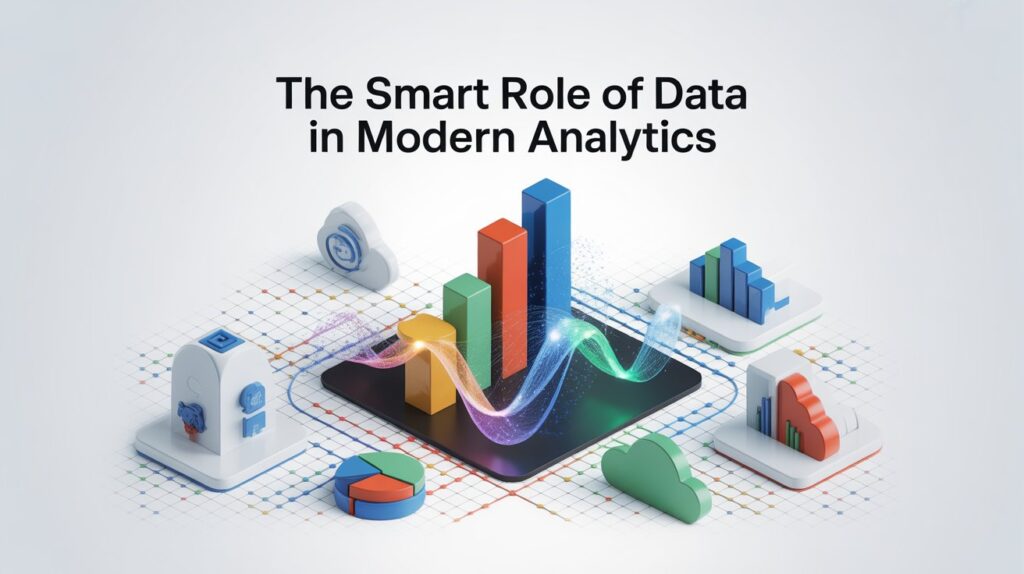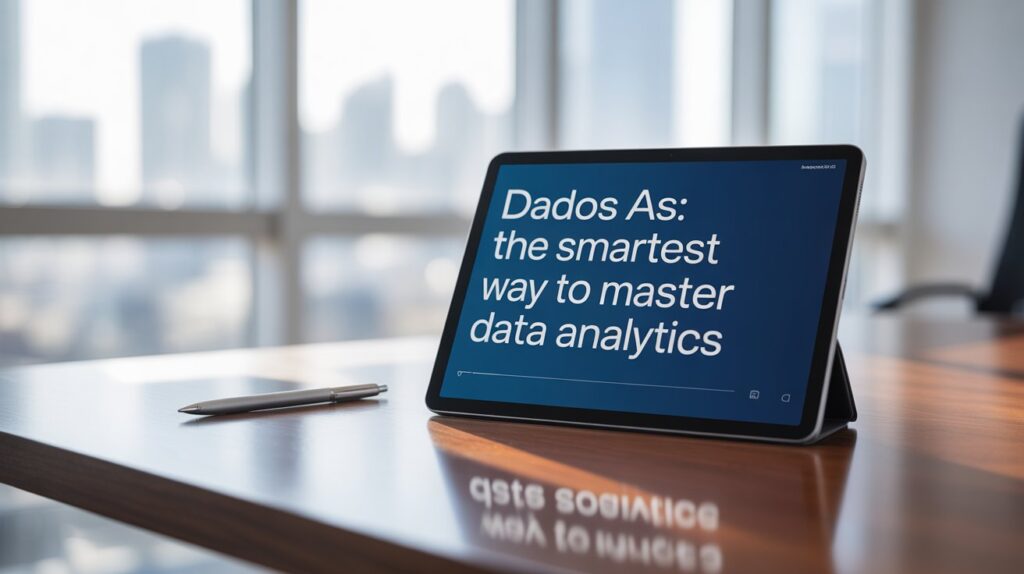Introduction – How Dados as Is Changing Data Forever
In today’s fast digital world, data drives every business decision. Companies around the globe rely on accurate analytics to make faster, better choices. That’s where Dados as steps in. It doesn’t just collect information — it transforms it into actionable insights. This revolutionary method helps organizations handle massive datasets without complexity, offering a smarter, more intelligent approach to understanding patterns and trends.
Unlike traditional systems, Dados as integrates advanced technology like AI and machine learning to simplify processes. It creates a connected ecosystem that enables real-time access and integration of information. The result? Businesses gain the ability to uncover hidden opportunities faster than ever before.
What Exactly Is Dados as and Why It Matters
Dados as represents a concept where data functions as a living, breathing system, not as isolated pieces. It brings together sources from across departments into one cloud-based structure. This integration helps companies analyze information seamlessly, making analytics more efficient and comprehensive.
Through advanced algorithms, Dados as allows both analysts and non-technical users to gain insights easily. It reduces the friction of handling complex models by turning raw figures into clear visualizations and forecasts that everyone can understand.
The Innovative Core Concept Behind Dados as
At its core, Dados as treats data as a collective force. It builds an interconnected network that adapts to changing business needs. Instead of viewing datasets as static, it enables dynamic interactions, ensuring more accurate and timely results. This approach creates a foundation for decision-making that is both agile and reliable.
The Smart Role of Dados as in Modern Analytics

Modern analytics demands speed, clarity, and contextual accuracy. Dados as plays a crucial role in achieving that balance. It empowers organizations to analyze and visualize data-driven outcomes in real-time, leading to faster and more informed decisions. This smarter approach saves time and enhances performance across departments.
The table below compares traditional analysis with Dados as to show the difference in capability and efficiency:
| Aspect | Traditional Data Analysis | Dados as |
| Data Storage | Separate systems, siloed | Unified cloud integration |
| Processing Speed | Manual and slow | AI-driven, real-time |
| Insights | Static reports | Dynamic, actionable insights |
| Decision Support | Limited | Comprehensive and predictive |
| User Experience | Technical-only | User-friendly, intuitive for all |
How Dados as Enhances Data-Driven Decisions
By using machine learning and artificial intelligence, Dados as improves decision accuracy and reduces human error. It analyzes data patterns, identifies trends, and predicts outcomes with precision. This helps businesses act quickly on opportunities, improving their competitive advantage.
For example, in finance, Dados as helps track market trends and forecast shifts. In healthcare, it integrates patient data for better diagnosis and treatment outcomes — truly transformative for decision-making.
Real-World Impact – Where Dados as Creates Results
Dados as isn’t theory; it’s already reshaping industries. Retailers use it to personalize shopping experiences, boosting sales and customer satisfaction. Manufacturers rely on its analytics to optimize operations and reduce costs. In healthcare, Dados as supports treatment planning by linking data from multiple sources into one holistic view.
It also empowers enterprises to understand consumer behavior, improve marketing strategies, and enhance product development. This wide range of applications makes Dados as a powerful tool for achieving measurable growth and innovation.
How Dados as Is Powering Global Industry Shifts
From finance to e-commerce, Dados has driven a global shift in data usage. Its intelligent integration and AI-powered algorithms enable businesses to adapt to market changes rapidly. This transformative approach makes industries more resilient, allowing them to respond to consumer demands faster and more efficiently than ever before.
Benefits That Make Dados as a Game-Changer
The benefits of Dados as go beyond simplifying processes. It enhances productivity, increases accuracy, and makes data accessible to all users. By offering real-time insights, it helps companies make strategic moves with confidence.
Moreover, Dados as promotes collaboration by enabling teams to share data seamlessly. This connected environment fosters innovation and helps organizations unlock their full potential. Its comprehensive framework is setting a new standard for data-driven success.
Challenges Dados as Faces and the Road Ahead
Despite its strengths, Dados as faces challenges like data privacy, security, and integration with existing systems. Businesses must ensure that regulations are met and that sensitive information remains protected. Costs of implementation can also be significant, especially for smaller firms.
However, the benefits far outweigh these obstacles. As technology evolves, Dados as will continue to improve and adapt. With stronger AI and machine learning models, its capabilities will only expand, opening the door to endless possibilities for growth and innovation.
Future Horizons – The Next Evolution of Dados as
The future of Dados as lies in combining AI, cloud computing, and predictive analytics. As systems become more intelligent, they’ll enable deeper insights and faster decision-making. Companies will increasingly rely on automation and real-time data processing to stay ahead.
Over time, Dados as will also influence how businesses interpret and visualize information. With interactive dashboards, intuitive interfaces, and seamless integration, the next generation of analytics will be smarter, simpler, and more human-centered than ever before.
Final Thoughts – Why Dados as Defines the Future of Data
Dados as is not just another buzzword — it’s a revolutionary approach that’s reshaping the future of data. Its ability to streamline integration, enhance efficiency, and deliver valuable insights makes it a cornerstone of modern analytics.
As businesses embrace Dados as, they’re unlocking new opportunities for success. This paradigm shift ensures that the world of data will never look the same again — a transformative, powerful, and intelligent step toward the next era of digital innovation.
Frequently Asked Questions About Dados as
1. What does Dados as mean in data analytics?
Dados as refers to a modern framework that treats data as a unified system rather than isolated sets. It integrates AI, machine learning, and cloud computing to help organizations make smarter, faster, and more accurate business decisions.
2. How does Dados as improve decision-making in businesses?
Dados as enhances decision-making by turning complex datasets into clear insights. It uses predictive analytics and real-time data processing to help companies identify trends, forecast outcomes, and make more informed strategic choices across departments.
3. What are the main benefits of using Dados as?
The major benefits of Dados as include improved productivity, better data accuracy, seamless integration, and faster real-time analytics. It empowers both technical and non-technical users to access and understand data insights through intuitive dashboards and interactive visualization tools.
4. Which industries are using Dados as technology today?
Dados as is widely used in finance, healthcare, e-commerce, and manufacturing. In healthcare, it connects patient data for better treatments, while in retail, it helps personalize customer experiences and optimize sales strategies.
5. How does Dados as differ from traditional data systems?
Unlike traditional systems that store data in silos, Dados as provides centralized cloud integration. It enables real-time analysis, AI-powered automation, and collaboration across teams — turning static reports into dynamic, actionable insights that drive growth.
6. What challenges come with adopting Dados as?
Common challenges include ensuring data security, managing privacy regulations, and handling the costs of implementation. However, these can be mitigated with proper data governance policies, encrypted systems, and scalable cloud infrastructure.
7. Is Dados as suitable for small and medium-sized enterprises (SMEs)?
Yes. Dados as offers scalable solutions that can be tailored for SMEs. With cloud-based models and automated analytics, smaller companies can access the same powerful insights that large enterprises use — without heavy investment in infrastructure.
8. What does the future of Dados as look like?
The future of Dados as will revolve around AI automation, predictive modeling, and data democratization. As technologies evolve, Dados as will continue to make data analysis more intelligent, accessible, and human-centered, redefining how businesses interact with information.
9. Can Dados as help improve customer experience?
Absolutely. Dados as enables businesses to track customer behavior in real-time, personalize recommendations, and predict future needs. By connecting data sources, it enhances user experiences and builds stronger customer loyalty through better data-driven insights.
10. How can companies start implementing Dados as?
Organizations can begin by identifying data silos, integrating cloud-based analytics tools, and training teams to use Dados as platforms effectively. Partnering with AI and data management experts ensures smooth migration, security, and long-term performance optimization.
ALSO READ:
Soutaipasu: How A Simple Tradition Became A Global Cultural Symbol
K Caara Leasing: Drive Affordable Luxury Cars In 2025
3d659 com: Insider Guide to Online Risks and Smart Finance

